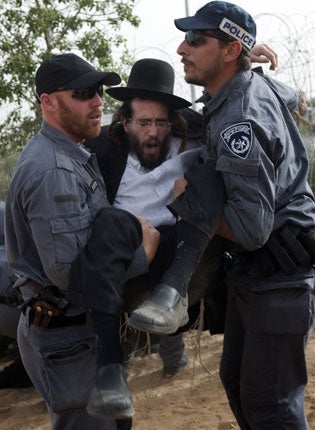Ultra-orthodox fury at removal of ancient remains from Israel hospital
Construction of bombproof emergency unit in Israeli city sparks exhumation protests

Your support helps us to tell the story
From reproductive rights to climate change to Big Tech, The Independent is on the ground when the story is developing. Whether it's investigating the financials of Elon Musk's pro-Trump PAC or producing our latest documentary, 'The A Word', which shines a light on the American women fighting for reproductive rights, we know how important it is to parse out the facts from the messaging.
At such a critical moment in US history, we need reporters on the ground. Your donation allows us to keep sending journalists to speak to both sides of the story.
The Independent is trusted by Americans across the entire political spectrum. And unlike many other quality news outlets, we choose not to lock Americans out of our reporting and analysis with paywalls. We believe quality journalism should be available to everyone, paid for by those who can afford it.
Your support makes all the difference.At least 30 ultra-orthodox Jewish demonstrators have been arrested in angry protests at the removal of ancient burial remains to make way for construction of a bombproof hospital emergency room in the southern Israeli city of Ashkelon.
Protesters tried to climb perimeter fences at the main Barzilai hospital yesterday in the hope of halting the excavation, described by the ultra-orthodox deputy education minister Meir Porush as an "embarrassment and a disgrace". On Saturday night, demonstrators burned rubbish bins and blocked roads in ultra-orthodox neighbourhoods of Jerusalem as the exhumation started.
Ashkelon is within range of rockets from Gaza and the medical authorities had decided that a bomb-proof emergency room within the hospital was essential for the welfare of patients.
Originally, a divided Israeli cabinet decided – with the support of Prime Minister Benjamin Netanyahu – to appease the ultra-orthodox community by relocating the site at an additional cost of several million dollars. The decision was seen by secular critics as a new high point for the political power wielded in the government coalition by an increasingly assertive ultra-orthodox community. There followed a massive public outcry at the increased costs, and the director general of the health ministry, Dr Eitan Chai-Am, announced he was resigning in protest at the decision. Prime Minister Netanyahu performed a swift U-turn.
Yesterday, during the weekly cabinet meeting, he said: "After the second Lebanon war, we made a decision to erect a new emergency room next to Barzilai medical centre. There is an important ultra-orthodox public that is offended by this. We reached a decision to implement [the plan], and the general public's interest is the deciding factor."
On a visit to Ashkelon yesterday, Mr Porush said angrily: "It was possible to find alternatives to digging up graves that may be Jewish. It would have been preferable to have found a compromise."
But Mr Netanyahu's revised stance was bolstered yesterday by the Israel Antiquities Authority, which said that the preliminary findings from the excavation showed that the remains were not Jewish but Byzantine. The exhumations could be seen in real time on the website of the IAA, which said it was streaming the work as a "neutral entity" and for "transparency".
In Yedioth Ahronoth, Nahum Barnea, a popular columnist, backed Mr Netanyahu's change of heart. "The majority of the Israeli public would not have been able to comprehend a government that favours dead pagans over live patients." And responding to Mr Porush's objections, the head of the Ashkelon municipal council, Benny Vaknin, said: "The real shame is with the people who delayed construction of the bombproof emergency room, while during Operation Cast Lead [Israel's 2008-09 military onslaught on Gaza during which Palestinian militants fired a barrage of rockets at Ashkelon] people could have died... That is the biggest disgrace."
There was a heavy police presence in Ashkelon and surrounding districts, to prevent any disruption. Police also deployed in force along main roads in Jerusalem. In the old ultra-orthodox inner Jerusalem neighbourhood of Mea Sharim, demonstrators called for "the prevention of any possibility to desecrate the graves", and leaflets were distributed in the city calling for "the land of Israel to go to war".
Haaretz quoted police sources as saying say that due to the thin presence of the Eda Haredit, the extreme religious sect in the forefront of violent demonstrations against the authorities (including against the opening of a city centre park on the Sabbath in Jerusalem) they did not expect serious clashes in Ashkelon. Senior figures of the important Hasidic sect in Ashdod had indicated they not intend to take part in the unrest, it reported.
Dr Leonid Eidelman, chairman of the Israeli Medical Association, who visited Barzilai, warned police medical staff could be targeted by violent protesters. But he added: "The bombproof emergency room is critical for the residents of the south, and we are hopeful its construction will be completed quickly".
Join our commenting forum
Join thought-provoking conversations, follow other Independent readers and see their replies
Comments